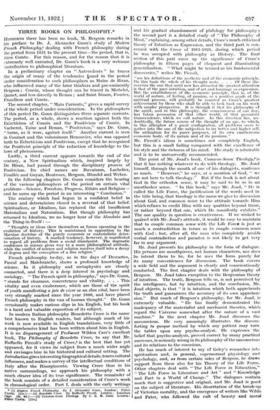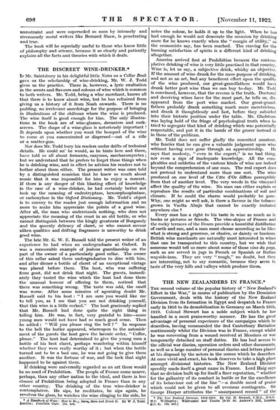THREE BOOKS ON PHILOSOPHY.* jriTBEIRTO there has been no book,
M. Bergson remarks in his preface to Dr. J. Alexander Gunn's study of Modern French Philosophy; dealing with French philosophy during
the period from 1851 to the present time—the period, that is, since Comte. For this reason, and for the reason that it is extremely well executed, Dr. Gunn's book is a very welcome contribution to philosophical literature.
In a preliminary chapter on " Antecedents " he traces the origin of many of the tendencies tpund in the period under consideration to such philosophers as Maine de Biran, who influenced many of the later thinkers and pre-eminently Bergson ; Cousin, whose thought can be traced in Miehelet, Quinet, and less directly in Renan ; and Saint Simon, Fourier, Proudhon and Comte.
The second chapter, " Main Currents," gives a rapid survey of the whole period under consideration. In the philosophers of this period Dr. Gunn distinguishes three separate currents. The period, as a whole, shows a reaction against both the Eclecticism of Cousin and the Positivism of Comte. In Vacherot, TaMe and Renan, " Positivism," says Dr. Gunn, " turns, as it were, against itself." Another current is seen in Cournot and the voluminous Renouvier, who was opposed both to Eclecticism and Positivism, except that he recognized the Positivist principle of the reduction of knowledge to the laws of phenomena.
Lastly, a third current appears towards the end of the century, a New Spiritualism which, inspired largely by De Biran, had passed through the disciplinary process of Positivism. Its chief names are Ravaisson, Laehelier, Fouillee and Guyan, Boutroux, Bergson, Blondel and Weber. In the following chapters Dr. Gunn considers the bearing
of the various philosophers of the period on certain vital problems—Science, Freedom, Progress, Ethics and Religion—
and he sums up the period in an interesting " Conclusion."
The century which had begun in a confident belief in science and determinism closed in a reversal of that belief. Spiritualism, or Idealism, has replaced the old insufficient Materialism and Naturalism. But though philosophy has returned to Idealism, we no longer hear of the Absolute and the Thing-in-Itself : —
" Thoughts or ideas show themselves as forces operating in the evolution of history. This is maintained in opposition to the Mandan doctrine of the purely economic or materialistic deter- mination of history. A marked tendency, however, is manifested to regard all problems from a social standpoint. The dogmatic confidence in science gives way to a more philosophical attitude, while the conflict of science and religion resolves itself into a decay of dogma and the conception of a free religion."
French philosophy to-day, as in the days of Descartes, Pascal and Malebranche, shows a profound knowledge of science. In it philosophy and metaphysics are closely connected, and there is a deep interest' in psychology and sociology. " The French spirit in philosophy," says Dr. Gunn,
" stands for clearness, concreteness and vitality. . . . This vitality and even exuberance, which are those of the spirit
of youth manifesting a joie de vivre or an élan vital, have been very strongly marked since the year 1880, and have placed
French philosophy in the van of human thought." Dr. Gunn occasionally makes curious slips in his English, but his book is a lucid and valuable exposition of its subject.
In modern Italian philosophy Benedetto Croce is the name
best known to English readers, but although much of his work is now available in English translations, very little of a comprehensive kind has been written about him in English. It is no disparagement of Profossor Wildon Carr's excellent book, The Philosophy of Benedetto Croce, to say that Mr.
Raffaello Piccoli's study of Croce,2 is the best that has yet appeared, for it views its subject from a much wider angle and envisages him in his historical and cultural setting. The Introduction gives interesting biographical details, traces cultural influences, and makes a survey of the intellectual conditions of Italy after the Risorgimento. Viewing Croce thus in his native surroundings, we approach his philosophy with a much clearer idea of its true significance. The remainder of
the book consists of a detailed consideration of Croce's work in chronological order. Part I. deals with the early writings
• (1) Modern French Philosophy. By J. Alexander Gunn. London : Fisher tinwta. [218.1---(2) Benedetto Croce. By Itattnello Pleeoll. London : Jonathan itter.rthrirtn ed. 121.5.1)—(3) Common-Sense Medan. By G. E. M. Joad. London : . and his gradual abandonment of philology for philosophy the second part is a detailed study of " The Philosophy of Mind," explaining, among other details, Croce's much criticized theory of Intuition as Expression, and the third part is con- cerned with the Croce of 1911-1921, during which period he was occupied with philosophy as History. The final section of this part sums up the significance of Croce's
philosophy in fifteen pages of eloquent and illuminating generalization. " What might be termed as his fundamental discoveries," writes Mr. Piccoli,
"are his definitions of the aesthetic and of the economic principle. On this basis th-i whole of his thought rests. . . . Of these dis- coveries the one that until now has attracted the greatest attention is that of the pure intuition, and of art and language as expression. But the establishment of the economic principle, that is, of the world of nature, of feeling, of passion, as a positive grade of the spiritual process, will probably be counted as Croce's greatest achievement by those who shall be able to look back on his work with ampler perspective. It is through it that his philosophy of the spirit, and in this philosophy, the consciousness of our day, has taken possession of that other world, of that persistent transcendence, which we call nature. In this direction lies. un- doubtedly, the future course of the thought of an age, to which, in this afterglow of a great conflagration, all problems seem to gather into the one of the subjection to its better and higher self, the utilization for its purer purposes, of its own cumbersome economic body, of its nature and of its passions."
Mr. Piccoli's idiom is sometimes not completely English, but this is a small failing compared with the excellence of his style and the richness of his mind. His study is admirable and is to be unreservedly recommended.
The point of Mr. Joad's book, Common-Sense Theology,' is that it has nothing whatever to do with theology. Mr. Joad himself, through the mouth of one of his dialogists, confesses as much. " However," he says, at a mention of God, " we are not here to talk theology." But if the book is not about God in the orthodox sense, it may be said to be so in an unorthodox sense. " In this book," says Mr. Joad, " He is called the Life Force, the justification of the words used in the title being, that theology is the name we give to discussion about God, and common sense to the attitude towards Him which refuses to credit Him with any qualities beyond those, or rather beyond that one, which He manifestly exhibits."
The one quality in question is creativeness. If we wished to quirrel with Mr. Joad's attitude, it would be easy to maintain
that to couple common sense with the Life Force is just as much a contradiction in terms as to couple common sense with God : but, after all, the man who completely avoids verbal contradiction and paradox is not likely to get very far in any argument.
Mr. Joad presents his philosophy in the form of dialogue. His persons are mouthpieces, not human characters, nor does he intend them to be, for he uses the form purely for its many conveniences for discussion. The book covers a wide field and the argument is clearly and conscientiously conducted. The first chapter deals with the philosophy of Bergson. Mr. Joad takes exception to the Bergsonian theory of intuition. The truth, Bergson tells us, is not perceived by the intelligence, but by intuition, and the conclusion, Mr. Joad objects, is that " it is intuition which both apprehends the truth and guarantees the accuracy of its own apprehen- sion." But much of Bergson's philosophy, for Mr. Joad, is extremely valuable. " He has finally demonstrated the inadequacy of the materialist and mechanist theories, which
regard the Universe somewhat after the nature of a vast machine." In the next chapter Mr. Joad discusses the unconscious. He very amusingly illustrates the discom- forting to quoque method by which any patient may turn
the tables upon any psycho-analyst. He expresses the belief that psycho-analysis, proved correct by many practical successes, is seriously wrong in its philosophy of the unconscious and its relations to the conscious.
He has much of interest to say of Geley's researches into
spiritualism and, in general, supernormal physiology and psychology, and, as from certain sides of Bergson, he draws support from these also for his Theory of the Life Force. Other chapters deal with " The Life Force in Education," " The Life Force in Literature and Art " and " Knowledge and Fact in a World of Change." The dialogues contain much that is suggestive and original, and Mr. Joad is good on the subject of literature. His dissertation of the break-up of Victorian morality, and the emergence of writers like Wilde and Pater, who followed the cult of beauty and moral
unrestraint and were superseded so soon by intensely and strenuously moral writers like Bernard Shaw, is penetrating and true.
The book will be especially useful to those who know little of philosophy and science, because it so clearly and patiently explains all the facts and theories with which it deals.



























































 Previous page
Previous page